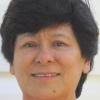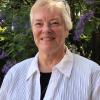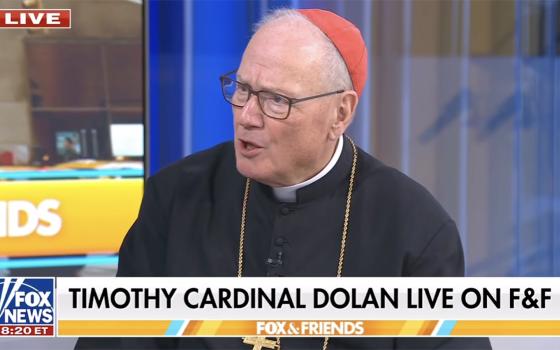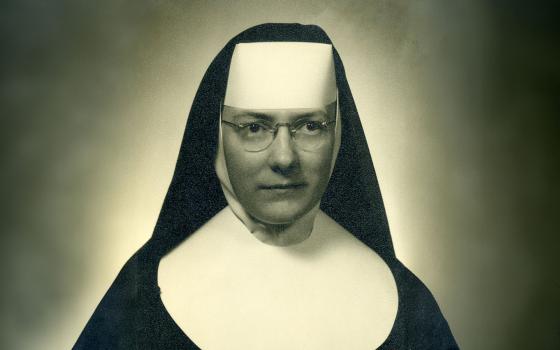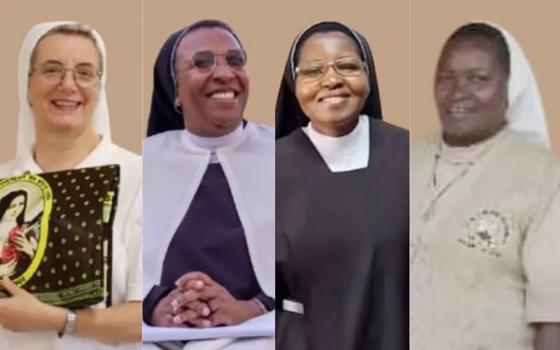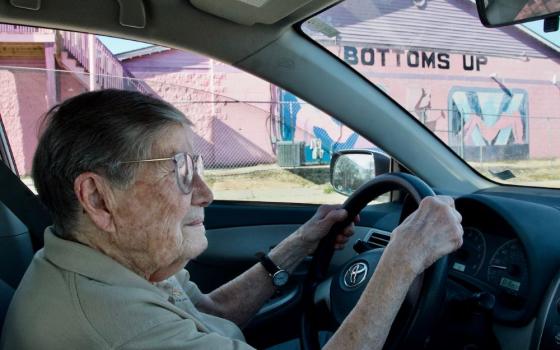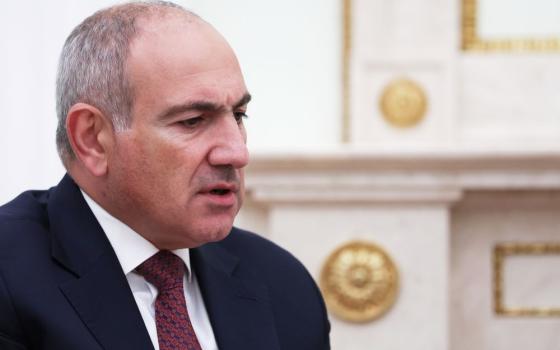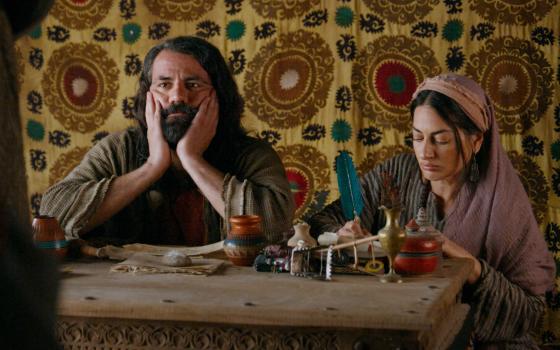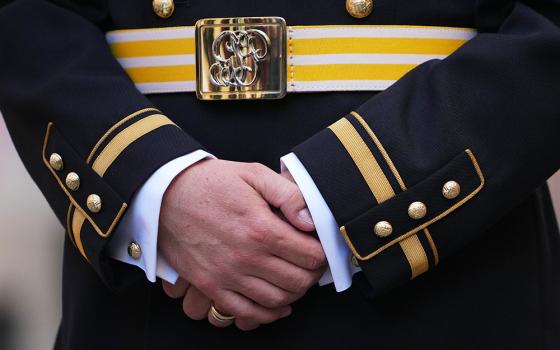
Sr. Oliva Olivares from the Missionary Guadalupanas of the Holy Spirit leaves water beneath a mesquite tree in the Sásabe community in the Arizona desert for migrants crossing the border in that area to drink. (Peter Tran)
Editor's note: Global Sisters Report's new series, "Welcoming the Stranger," takes a closer look at women religious working with immigrants and migrants. While we cover this topic often, this series will feature sisters and organizations networking to better serve those crossing borders, global migration trends and the topic of immigration in the upcoming U.S. presidential election.
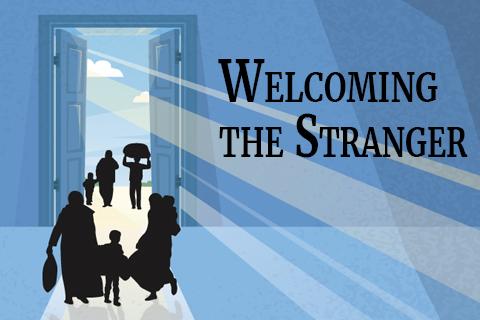
Walking in the desert, under the blazing sun and over arid land, is much more than a simple adventure for the thousands of migrants who dream of reaching the "American dream." For many, it represents a journey of several months filled with countless dangers, extortion, and crossing many countries with no money, with only the hope that God will bring them to the United States safely. However, many do not make it because they encounter death along the way.
According to the International Organization for Migrants, at least 8,565 people died on migration routes worldwide in 2023, making it the deadliest year ever recorded.
Sister Oliva, from my congregation, the Missionary Guadalupanas of the Holy Spirit, shared with me that she traveled to Sásabe, Arizona, on a mission to leave gallons of water under the mesquite trees for migrants crossing the desert.
'Sister Oliva spoke to me of a 'very intense' experience, because she was able to see life in the desert, which passes through it in a transitory way, and that which remains there permanently in the form of shoes, photographs, crosses …
During our conversation, she said that walking through these lands brought to mind so many generations of migrants who have traveled the same path in the past, including grandparents, parents, sons and daughters, toddlers and young people, who risk their lives in search of a better life. This experience has been shared by many families, including my own, who emigrated permanently in 1984.
Sister Oliva spoke of a "very intense" experience, because she was able to see life in the desert, both that which passes through it in a transitory way, and that which remains there permanently in the form of shoes, clothes, photographs, crosses, backpacks, among other belongings the migrants left behind. The desert harbors not only life, but also death, and those personal items were "signs of death, defeat, despair, frustration and failure" which affect anyone who crosses it.
Despite these challenges, Sister Oliva highlights the generosity of people who elevate the dignity of others by thinking of this work of love of bringing water to help tired, thirsty and dehydrated people who faint under the heat of the desert. She describes this as a spiritual experience: "It was as if God had taken me to the desert to speak to my heart, and to live an experience that I did not have myself when I came to the United States," like when God says in the book of the Prophet Hosea, "I will allure her into the desert and speak to her heart." (Hosea 2, 16)
As I listened to her talk about her experience, people I know, and others I have heard about who are at the border trying to get there, came to mind. She told me that while she was in the desert, in a moment of stillness, a poem welled up in her heart to honor the lives of so many brave people who left their families behind in pain, in search of a better life, without knowing what awaited them on their journey. In that moment of silence in the desert she felt "the need to pray and honor the lives of so many migrants throughout the world who are leaving their homes to seek a better quality of life for their families."
Religious leaders, humanitarian personnel and border residents bring water to some of the most remote areas of the Arizona desert with the purpose of saving the lives of undocumented immigrants.
This poem by Sr. Oliva Olivares Gutiérrez is for all migrants.
To you who left your country ...
To you who have left your country, your city, your town, your family,
who risked crossing sea, river, deserts and mountains, in search of a new life,
and set out on your journey,
leaving your family in pain, assuring them that you will soon return.
You trust in the presence of God
Who accompanies you in your life,
knowing that He will always be with you,
and that He never forgets you.
You endure danger, hunger, cold, heat, falls,
pain, sadness, mistreatment, anguish.
You are confident that you will reach your final destination.
There is something deep within you
that makes you decide,
to opt for a better life
even if you have to suffer.
What a great adventure you live.
I can't even imagine it,
although, yes, I can understand,
that there is a desire for quality.
Your family values your determination, and
your loyalty as you struggle to build a new life,
even if you live with loneliness.
To you woman, man, girl, boy, baby,
who has left footprints while walking,
thank you for being so brave and daring to fight.
I don't know what your destination was,
but you arrived in one place;
whether you lived or died, I don't know,
I want to honor your dignity today.
Your goal was to cross,
even though you didn't know where to go,
but wherever you are today,
that is today, that is your place.
They are worthy of recognition.
The steps they have left
have made the desert
a sacred space.
By leaving their footprints as they went their way,
they have served as a guide for others
to reach their destination more easily.
There are many crosses planted in the desert;
with each one of them we honor the life
that, by something or someone, was taken from them.
Some crosses have names, because the person could be recognized,
While other crosses do not, because they could not be identified,
but all are a sign of respect and dignity.
Today I bless your very existence and your person,
for being a part of history,
and I want you to know
that you are in our memory.
Thank you, migrant brothers and sisters,
how admirable is your courage;
we are very grateful
for the testimony of your life. Amen.
Advertisement
Migration has not ended, nor will it end soon, because poverty, violence, insecurity and poor administration in our countries are forcing people to seek better life opportunities, regardless of the economic cost or the risk to their lives. Coming to the U.S. is also no guarantee that their lives will be better, but many take the risk of crossing the Arizona desert in search of hope.
Under the slogan "humanitarian aid is not a crime," religious leaders, humanitarian personnel, and border residents bring water to some of the most remote areas of the Arizona desert, with the purpose of saving the lives of undocumented immigrants. Let us honor the right of every person to seek a better life.
[This story was originally published in Spanish on April 12, 2024.]
